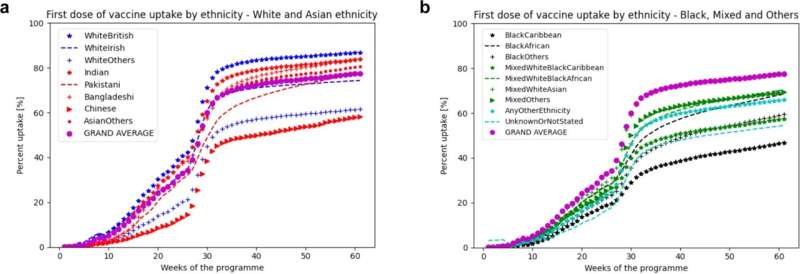This article has been reviewed according to Science X's editorial process and policies. Editors have highlighted the following attributes while ensuring the content's credibility:
fact-checked
peer-reviewed publication
trusted source
proofread
Analysis of vaccine uptake among UK women provides valuable insights

Only three-quarters of women of reproductive age were vaccinated against COVID-19 by February 2022, new research has found.
The study, published today in Nature Communications by researchers from King's finds in the population overall, vaccine uptake was greatest by women who were older, in the least deprived groups, and of White ethnicity. However, when these three characteristics were considered together, minority ethnic group was most closely associated (and deprivation the least) with vaccine uptake. Researchers noted there were substantial differences between specific ethnic groups.
The study analyzed data from the Office for National Statistics (ONS) and the National Immunisation Management Service in England, between 8 December 2020 and 15 February 2022. This time period included opportunities to receive both the first and second doses by all women of reproductive age.
Researchers found that if considered by ONS aggregated ethnicity groupings (of White, Asian, Black, Mixed, or Other backgrounds), important differences within those aggregated groups were obscured. While first and second dose vaccine uptake were similar, vaccine uptake was greatest by White British women, followed by women of Indian, Bangladeshi, and Other Asian backgrounds, all of whom had uptake above the population average for women of reproductive age.
Vaccine uptake similar to the average was seen for women of Pakistani or Mixed White and Asian background, Below-average vaccine uptake was seen by all other specific ethnic groups, including women of White Irish, White Other, or Chinese backgrounds, with the lowest uptake by Black Caribbean women.
Professor Laura Magee said, "It is now clear that to increase vaccine uptake by women of reproductive age in the UK, it will be critical that we tailor our messaging to specific ethnic groups. These insights are valuable for future vaccination programs, to reach specific groups who may be reluctant to accept vaccinations. Our analyses also highlights the need to assess, understand and encourage vaccination among women of reproductive age."
More information: Laura A. Magee et al, National surveillance data analysis of COVID-19 vaccine uptake in England by women of reproductive age, Nature Communications (2023). DOI: 10.1038/s41467-023-36125-8




















